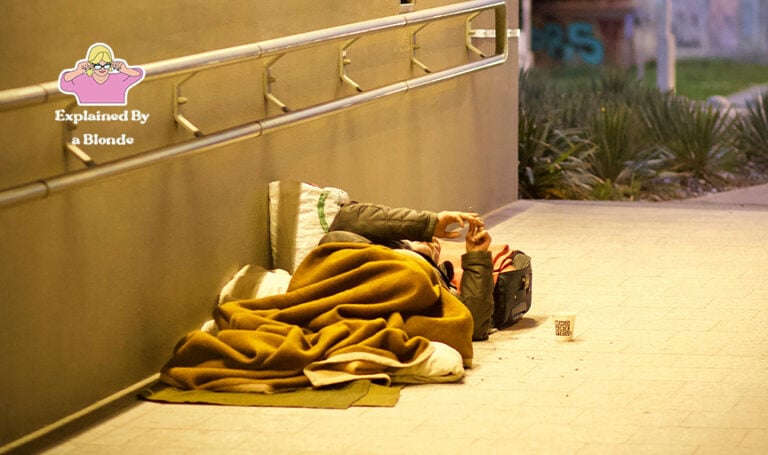The Criminal Justice Bill will negatively impact over 300,000 homeless people across the UK

The Criminal Justice Bill is one of the most hotly debated pieces of legislation in recent times. Initially proposed in November 2023, it’s now reaching its critical report stages. Mark your calendars for Wednesday 15 May 2024, when MPs will hash out potential amendments on the House of Commons floor. The burning question? Just how horrifically dangerous this bill could be for the over 300,000 homeless people in the UK today.
Welcome back to Explained by a Blonde. This week, we’re diving into the far-reaching effects of the looming Criminal Justice Bill. And oh, did you catch the massive Conservative losses in last week’s elections? What a moment to behold—teehee.
But back to the matter at hand. In just a couple of days, our MPs will tackle possible tweaks to the Criminal Justice Bill. Homelessness charities like Crisis and Shelter are pushing hard for updates to some of the archaic clauses still present in the current bill.
In this article, I’ll unpack everything you need to know about how this law might seriously impact the safety and well-being of countless people without homes across the UK.
What is the Criminal Justice Bill?
The Criminal Justice Bill is all about setting the rules for how police handle offenders, focusing especially on anti-social behaviour and homelessness.
One of the key features of the Bill is its proposal to replace the 1824 Vagrancy Act. Remember that one? It’s the old law that first criminalised begging, rough sleeping, and prostitution. Back in August 2022, the UK government promised to repeal the Vagrancy Act, committing to “end rough sleeping” and earmarking over £800 million for tackling homelessness and rough sleeping in 2022, with an additional £2 billion planned for the following three years.
But here’s the twist: the repeal of the Vagrancy Act hasn’t actually happened yet. They’ve been holding off until they could find a suitable replacement. Now, it looks like the new Criminal Justice Bill might just swap out one highly problematic law for another.
How will the Criminal Justice Bill affect homeless people?
As we’re well aware, the Tory party aren’t exactly known for their compassionate approach to homelessness. After all, it was only six months ago that Suella Braverman claimed that rough sleeping was a “lifestyle choice.”
So, it isn’t wildly surprising that it is Rishi Sunak’s government pushing forward a bill that will not only criminalise homelessness but further ignite substantial social stigma for those who’re forced to sleep on the streets.
Crisis, one of the leading charities trying to end homelessness, is raising the alarm about the Criminal Justice Bill. They’re particularly concerned about how the new bill contains powers for police and local authorities to enforce against so-called “nuisance rough sleeping” in England and Wales. This could mean being forced to move, facing fines up to £2,500, or even imprisonment.
Plus, the bill is worryingly vague about what counts as “nuisance” behaviour. For example, this could range from excessive smells to sleeping in a doorway, looking like you’ve slept rough, or even appearing to be about to sleep rough.
It’s important to note that many women who sleep rough take shelter in doorways for safety reasons.
Criticism isn’t just coming from homelessness charities either. Politicians are also speaking out. Labour MP Yasmin Qureshi criticised the bill, stating: “I strongly object to the Bill’s provisions on nuisance rough sleeping. We must remember that rough sleeping is a symptom of other policy failures—such as housing, poverty, and mental healthcare provision. Rough sleepers need support, and I do not feel that criminalising those in need will help to resolve this issue.”
Paula Barker, another Labour MP, also made her feelings clear on the House floor:
The Conservatives promised to end rough sleeping by 2024. They also vowed to repeal the Vagrancy Act & decriminalise homelessness.
— Paula Barker (@PaulaBarkerMP) April 22, 2024
Instead rough sleeping is on the rise & the Tories’ Criminal Justice Bill is set to impose even harsher punishments for simply being homeless ⬇️ pic.twitter.com/FKCkRFEkSQ
And according to The Guardian, approximately 40 Tory backbenchers have threatened to rebel against these measures. Bad luck Rishi, looks like you’ve got no mates left.
The public’s view of homelessness is at stake here. Pursuing a bill that paints vulnerable individuals as nuisances rather than human beings deserving of equality and respect is both offensive and counterproductive.





